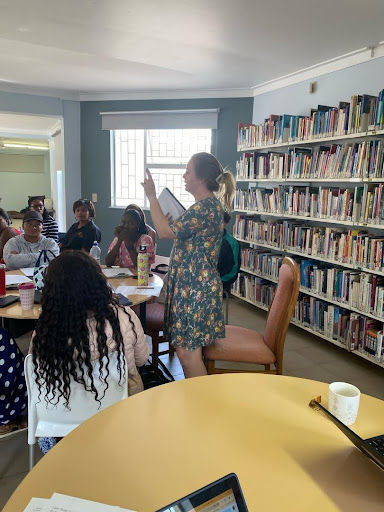A Path to Academic Success
- Windhoek International School
- Sep 29, 2023
- 4 min read
Dear WIS Community,

Did you know that reading to your child every night significantly improves their chances of academic success? Children who are read to regularly are more likely to excel in school and develop a lifelong love for reading. There's also another essential aspect of reading - the importance of reading in your home language.
Reading is a bedtime ritual; and also a powerful tool that shapes your child's cognitive development, language skills, and creativity. When you read to your child, you embark on a journey of discovery, imagination, and learning that can have a lasting impact on their future.
The Benefits of Reading Together
Language Development
Reading aloud exposes your child to a rich and diverse vocabulary, helping them build a strong language foundation. They not only learn new words but also grasp sentence structure and language patterns. This process is especially crucial in the Early Years, as it lays the groundwork for phonological awareness, a precursor to learning phonics. Before children can read letters with their corresponding sounds, they must first develop the ability to identify and differentiate sounds. Teachers facilitate this critical skill through engaging activities like rhyming exercises and interactive discussions. Listening and oral language comprehension are the essential building blocks upon which early reading skills are constructed.
Cognitive Skills
Reading stimulates brain development, enhancing your child's critical thinking and problem-solving abilities. It encourages them to ask questions, make connections, and explore their curiosity.
Bonding Time
Reading together creates precious bonding moments between you and your child. It fosters emotional connections, promotes a sense of security, and helps your child feel loved and valued.
Academic Success
Research consistently shows that children who are read to regularly perform better in school. They develop stronger reading comprehension skills, excel in various subjects, and are better prepared for academic challenges. Reading is also the bridge to good writing, as it exposes children to different writing styles, structures, and creativity that they can incorporate into their own writing. By being exposed to different types of writing, they will be better placed to deconstruct what they read and apply it to their own writing.
My child is learning English- should I read in English or our home language?
Reading in the language spoken at home has several advantages:
Cultural Connection
It helps children connect with their cultural heritage and identity, fostering a sense of pride and belonging. This is why, for example, during Namibian Heritage week, our local Educational Assistants shared Namibian stories, enhancing the cultural connection.
Language Proficiency
Reading in the home language contributes to strong language skills in both languages, enhancing bilingualism and multilingualism. In the Upper Primary grades, students read four books a year together as a class. We call these ‘set works’. We encourage parents to buy these titles in their home language as well as in English.
Family Tradition
Sharing stories in your home language creates a sense of continuity in family traditions and values.
Useful Resources
To support you in your reading journey with your child, we recommend exploring resources like BookTrust and Common Sense Media's book reviews. These platforms offer a wide range of recommended titles for children of all ages and interests. You can discover exciting new books and stories to share with your child, and the Common Sense Media platform also has useful parent guides.

Reading at WIS

Reading is a central feature of our school assembly. During these assemblies, Ms. Tanya-May, together with a selected student, models reading and thinking out loud, showcasing the joys of reading which also helps students develop critical thinking skills as they navigate the world of literature.
Building our home language resources
We are committed to celebrating the rich tapestry of languages within our school community. In addition to fostering language development in English, we also practise the innovative approach of translanguaging. Translanguaging allows students to utilise their home languages as valuable resources for learning. It is a dynamic process where students can conduct research and engage in discussions in their home language, enhancing their understanding and connection to various subjects. This approach recognizes the power of multilingualism and encourages students to draw upon their linguistic diversity as a strength in their academic journey.

To further support this initiative, we are continuously expanding our home language section in the library. We warmly welcome donations from parents who wish to contribute books and materials in their native languages. By building a diverse collection of resources, we create an inclusive and vibrant space that celebrates linguistic diversity, promotes cross-cultural understanding, and enriches the learning experiences of all our students.
The Challenge of Technology
In today's digital age, the allure of electronic devices can sometimes overshadow the joys of reading. The amount of time children spend reading for pleasure has been declining due to the prevalence of smartphones, tablets, and computers. As a school, we are actively working to promote reading and literacy. We are currently preparing a new order for our school library to ensure our students have access to a diverse selection of books that cater to their interests and reading levels.
Reading is a lifelong adventure. It's about nurturing your child's curiosity, creativity, and love for learning. By reading together in your home language and encouraging reading in all your child’s languages, you're giving your child the gift of cultural appreciation and a strong foundation for academic success.
Happy reading, everyone!
Warm regards,
Marcelle van Leenen
Primary Principal





Comments